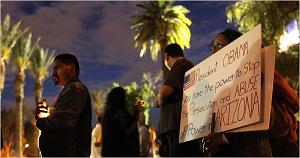ATLANTA When Jessica Colotl, an illegal immigrant college student, got arrested for a minor traffic violation at her suburban Atlanta campus, she became an accidental poster child for immigration reform.On Friday, after getting arrested and released from detention for the second time in just over a month, she told reporters at a news conference she hopes her ordeal can help persuade leaders to work for an overhaul of the country’s immigration laws.
“I just hope for the best and I hope that something positive comes out of this because we really need a reform to fix this messed up system,” the 21-year-old told reporters inside a shopping center that caters to metro Atlanta’s growing community of Hispanic immigrants. Colotl, who came close to deportation after the traffic arrest, looked overwhelmed by the crush of reporters shouting questions at her.Colotl is among hundreds of thousands of young people who have been brought into the U.S. illegally by their parents. She was 11 when her parents crossed the border with her from Mexico. Eventually, she graduated from high school in Georgia and entered Kennesaw State University in the fall of 2006. A sorority member who dreams of becoming lawyer, she was set to graduate with a degree in political science this fall.
Her first arrest came on March 30, the day after getting pulled over by university police for a minor traffic violation. She was charged with driving without a license and impeding the flow of traffic.Then, the Cobb County Sheriff’s Office turned her over to officials with U.S. Immigration and Customs Enforcement, who sent her to a detention center in Alabama. After lobbying by Kennesaw State officials and her sorority sisters, ICE released Colotl last week. Federal officials deferred action on her case for a year, allowing her to complete her classes.
But Cobb County Sheriff Neil Warren obtained a new warrant for her arrest on Wednesday, saying she lied about her address when she was booked into jail following her initial arrest. Making a false statement to law enforcement is a felony under Georgia law.Colotl turned herself in Friday morning and was released on $2,500 bond, according to sheriff’s office records.
Her criminal defense lawyer, Chris Taylor, said Friday that his client’s case is a perfect example of why U.S. immigration law needs reform.”Jessica may not have the documents that show that she’s an American citizen, but she’s an American,” Taylor said. “She’s an American in her heart because she believes in the values of this country.”U.S. Immigration and Customs Enforcement, which granted the deferral on her case last week, decided not to detain her again following Friday’s arrest, the agency said in a statement.
Taylor said he believes there is no merit to the sheriff’s charge that Colotl gave an incorrect address. The address she gave is a former address and her auto insurance and car registration still list it, he said. She also gave her current address to immigration officials and the sheriff’s office had access to that information, he said.Warren did not return calls Friday seeking comment and a spokeswoman for his office referred questions to a statement released Thursday. In it, the sheriff said Colotl knew she was in the country illegally and “further complicated her situation with her blatant disregard for Georgia Law by giving false information.”
The deferred action on Colotl’s case does not imply legal status but does authorize her to seek a work permit, ICE said.Colotl’s immigration lawyer, Charles Kuck, said he intends to seek an extension of that deferred status.
If Colotl is convicted on the felony charge of making a false statement, it will be virtually impossible to get a judge to agree to extend the deferral, Kuck said. But he said he is almost positive that the district attorney will dismiss those charges.Cobb County District Attorney Pat Head did not immediately return a call Friday seeking comment.Colotl is evaluating whether to return to Kennesaw State, but said she is certain she will graduate from college.
“I really believe that something positive should come out of this, probably an immigration reform or at least the DREAM Act,” she said.The DREAM Act, or Development Relief and Education for Alien Minors, would apply to illegal immigrants who arrived in the U.S. before the age of 16, have a high school diploma and have shown high moral character, among other requirements. The bill has been introduced many times in Congress but has yet to make it through.
It’s unclear how many people would qualify under the most recent version of the act, which could be folded into a larger immigration reform bill or pushed on its own.Both Taylor and Kuck are representing Colotl without charge.
Colotl and her lawyers were flanked by about a dozen representatives from civil liberties and immigrant rights groups at Friday’s news conference. They called for ICE to revoke the Cobb County Sheriff’s Office’s participation in a program known as 287(g), which allows local law enforcement agents to help enforce federal immigration laws.
“We are calling for an immediate termination of the 287(g) agreement in Cobb County,” said Azadeh Shahshahani of the American Civil Liberties Union of Georgia, adding that her office has contacted the Department of Homeland Security, which oversees ICE, and the U.S. Department of Justice, asking them to look into Cobb County’s use of the program.DHS spokesman Matt Chandler declined to comment and U.S. DOJ did not immediately return a call seeking comment late Friday. (AP)



